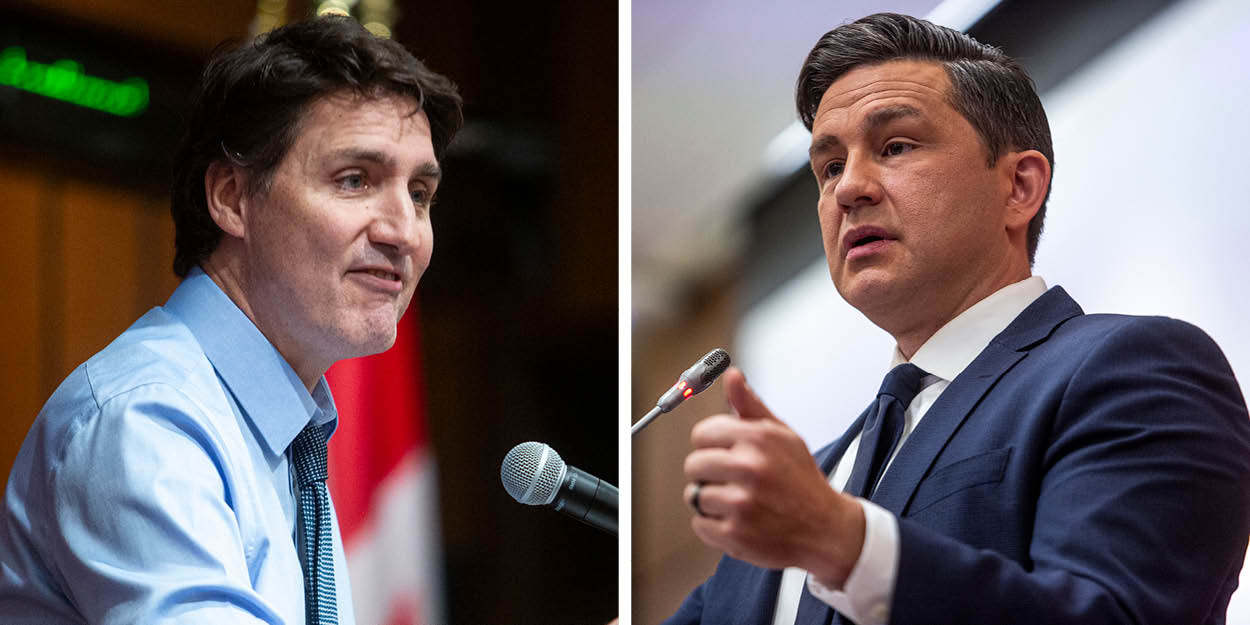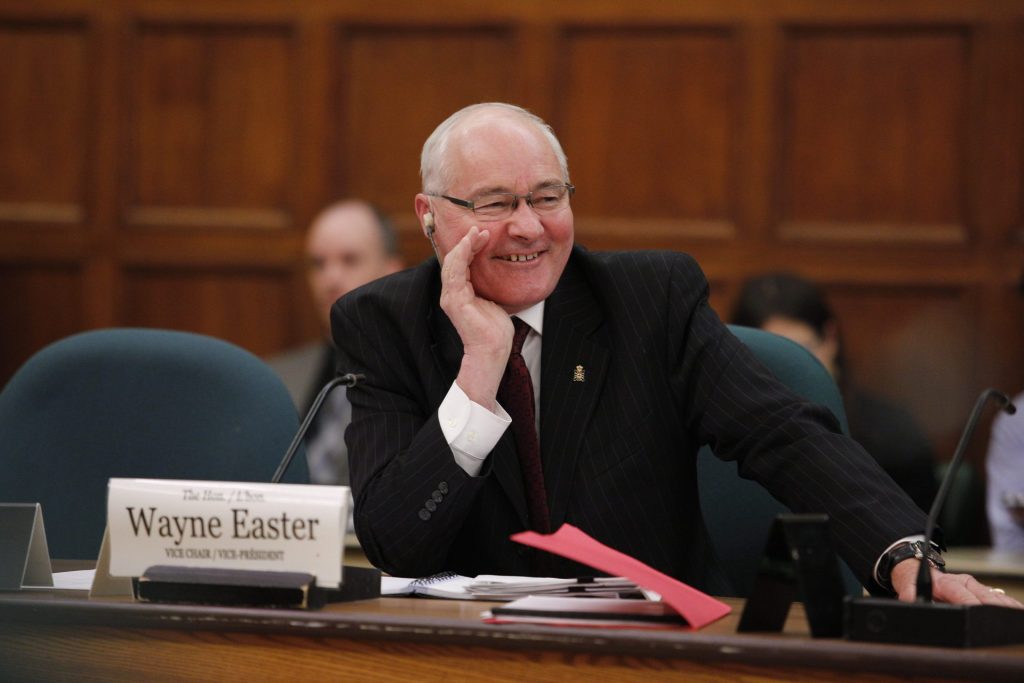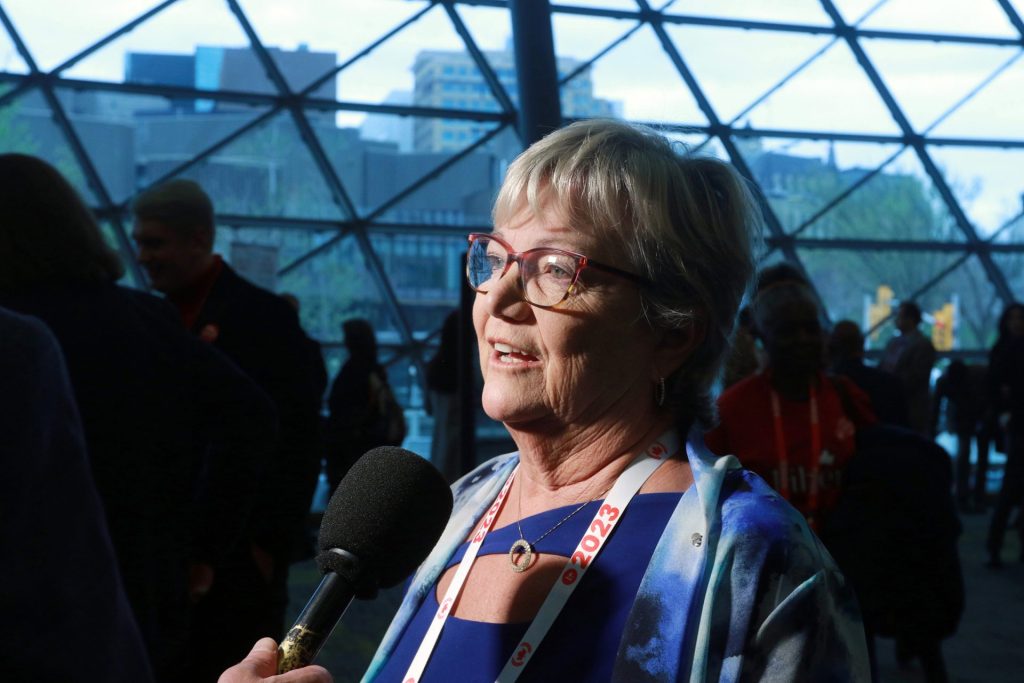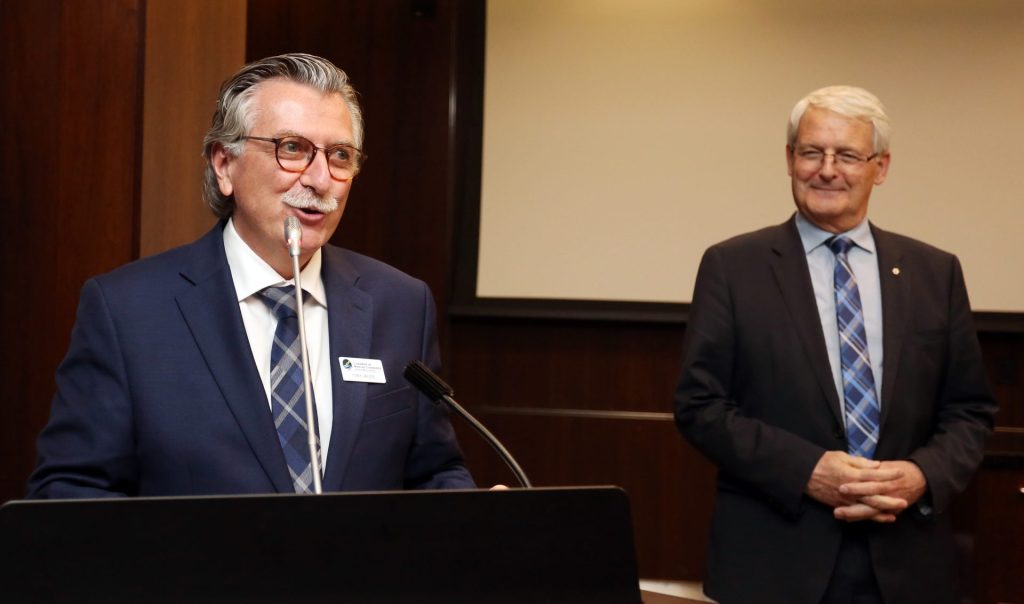Federal nomination contests yield candidates beholden to party leaders, not constituents, say ex-MPs

The nomination process in federal parties is significantly flawed and actively undermining democracy, yielding candidates who are beholden to party leaders, not to the constituents they represent, which raises questions about the integrity of the process, says a former nine-term MP as well as candidates who’ve participated in nomination contests.
“It undermines democracy when you get candidates that are basically chosen by the centre. And I’m not talking Liberals, I’m talking all parties,” said former cabinet minister Wayne Easter, who represented the riding of Malpeque, P.E.I., from 1997-2021, in an interview with The Hill Times.
“There’s too much say by all political centres in the nomination process. A nomination process should be left up to the local riding association, and the rules established by the national party.”

Nominations became a hot political issue earlier this year when two reports related to foreign interference raised concerns. One report called them a “gateway” for foreign actors looking to meddle in Canada’s domestic affairs.
However, nominations were known as the wild west of Canadian politics decades before these new concerns arose.
As part of an ongoing series on nominations, The Hill Times spoke with candidates from contested processes across party lines—some from recent years, others from decades earlier. Sometimes there’s controversy about the way a race is run. In other cases, the issue stems from the central party appointing a candidate without a race. Many nominations run without issue, but bitterly disputed processes routinely occur.
Across the board, those with experience in controversial nominations echo a similar refrain: there’s too much control from the centre. Several past candidates said the experience left them feeling personally disillusioned with the process, and had a negative impact on voters’ democratic engagement.
No contest
One recent high-profile Conservative nomination controversy stemmed from the lack of a vote.
Earlier this year, the Conservative Party used procedural tactics to nominate Parm Gill, a former Conservative MP who most recently served as an Ontario provincial cabinet minister, without a nomination race in the riding of Milton East-Halton Hills South, Ont.

D’Arcy Keene, a Halton Hills municipal councillor, told The Hill Times he was keen to run, but never received nomination papers because party headquarters wanted Gill.
“I have a reputation as being an independent, and maybe that’s what it was,” said Keene, who has been a Conservative member for decades through the party’s various iterations.
He said 10-20 years ago leaders used to influence nomination outcomes in a handful of ridings. But over the years it appears the “floodgates have opened up,” and this has undermined the will of grassroots members.
“They’re playing with the rules, bending the rules, interpreting the rules a certain way, squeezing certain people out by simply not allowing them to participate in the process,” said Keene. “Not only do they get so-called star candidates … they’re able to pick candidates who will be very loyal to the new prime minister, and won’t give them any difficulty once they form a government.”
Keene said it’s already hard to get average Canadians involved in politics, and people become even more cynical when they see political parties manipulating the process.
The Liberals also have a long track record of leader-appointed candidates. Most recently, Prime Minister Justin Trudeau (Papineau, Que.) appointed Laura Palestini, a Montreal city councillor, as the party’s candidate for the Sept. 16 byelection in LaSalle-Émard-Verdun, Que. The party made this appointment only days before the byelection was called, frustrating the two other potential contestants who had been preparing for weeks to seek the nomination.
Denied entry
In other cases, a vote is held, but controversy arises when some would-be candidates are denied a place on the ballot.
That happened in the recent Conservative nomination for Calgary Signal Hill, Alta., which was ultimately won by lawyer David McKenzie.

Wyatt Claypool, who wished to seek the nomination, was disqualified during the vetting process in the safe Conservative riding.
Claypool, editor of The National Telegraph, said he was never given a reason for his disqualification. He filed an appeal, but the national council upheld the ruling. Claypool said sources on the national council told him the party put together a nine-page dossier that was based on “complete nonsense.”
“It was full of stuff like, ‘I follow pro-life social media organizations,’ or, literally, the funniest one is ‘Wyatt called himself a neoconservative in an interview,’” said Claypool, describing the alleged contents of the document.
He claimed it also noted he had criticized the 2019 Conservative Party election campaign of then-leader Andrew Scheer (Regina—Qu’Appelle, Sask.). “If you’re not criticizing that campaign, you actually have a problem,” said Claypool.
Former Alberta deputy premier Leela Aheer was also disqualified.
Claypool said that he spent a total of about 1,200 hours preparing. He said if a party wants to appoint a candidate, they should announce it publicly as this would save potential candidates from investing significant time and energy.
Thumb on the scales
In some cases, candidates work for months on signing up members, only to have the candidacy denied, or they choose to withdraw over a controversy.
The 2024 Conservative nomination in Aurora—Oak Ridges—Richmond Hill, Ont., saw both.

Sabrina Maddeaux, a former National Post columnist, sought the Tory nomination, but faced stiff competition against former MP Costas Menegakis who held the seat from 2011-2015.
In May, Maddeaux posted a lengthy thread on the social media platform X (formerly Twitter), stating she was withdrawing over a “corrupted process.” She alleged one candidate had received early access to a membership list. Maddeaux said she had filed a complaint with the party, but there was “no evidence that a promised internal investigation is actually underway.”
Conservative Party communications director Sarah Fischer said the allegations were “completely false.”
Party rules state that only green-lit nomination candidates are to receive a copy of the current membership list for their riding—a vital asset in getting out the vote.

Another candidate, Aurora town councillor Rachel Gilliland, announced later that month that her candidacy had not been greenlit.
At the time, Fischer told CBC News that Gilliland was “in clear violation” of the party’s “rules and procedures for candidate nominations.” According to CBC, Fischer did not specify which rules were broken.
“When Sabrina dropped out, all of a sudden all eyes were on me,” Gilliland told The Hill Times.
She said she felt the party preferred another candidate. Despite this, “I chose put my head down” and focus on membership sales, she said, claiming to have outsold her opponents.
Gilliland said the party’s decision left her feeling that the process is “somewhat broken.”
If the party has a preferred candidate, that’s “their purview,” she said. But party officials should openly appoint that individual, not hold a nomination in which the party can “always add a little something to make it go in the favour of a certain candidate,” said Gilliland.
She noted there is no set length for a nomination campaign, meaning they sometimes run only a few weeks, but in other cases go on for months.
“It takes an excruciating amount of personal time and sacrifice to run a nomination, and a lot of funds,” said Gilliland.
“I feel a lot of this can be avoided just by at least being upfront,” she said, noting she made inquiries to party officials leading up to her decision to run, and received encouragement.
Gilliland has been a Conservative supporter going back to the time of then-prime minister Brian Mulroney in the 1980s. She said she remains a “conservative person,” but the experience will make her less likely to be involved in her electoral district association.
These stories also impact how voters perceive politics, and “less people are going to believe that their vote has any value,” she said.
Times don’t change
It’s not only the current rules that have produced controversy.
There were several highly contested Liberal nominations before the party made a series of changes to their rules in the 2010s which saw, among other updates, the party offer free memberships.
One of those controversies took place in 2008 in the riding of Cambridge, Ont.
That contest saw Rob Konduros lose the Liberal nomination to Gord Zeilstra by only 24 votes in a race where Zeilstra was fined over 262 nomination forms that were found to be improperly obtained. None of those members were disqualified from voting.
“I lost by 24 votes, but if you exclude the 262 votes Gord obtained illegally, I was the clear winner,” Konduros told a local newspaper at that time.
Zeilstra countered that he was not the only candidate to obtain forms without paying, but that he did not launch a formal complaint against his opponents.
Under the 2008 rules, the Liberal Party charged a $10 membership fee, and candidates were required to pay a $1 fee to purchase each hard copy form that was needed to sign-up members. The $1 fee was used to help the central party control the number of forms in circulation so an outsider could not sign-up large blocks of new members en masse.
Reflecting back on the experience from 16 years ago, Konduros told The Hill Times that what struck him most was the degree of influence from the central party.
“There were Liberal players locally who had good connections [at the regional headquarters] in Toronto, and were simply able to get the Toronto people to go their way,” said Konduros.
It seemed it was not a matter of central party officials favouring Zeilstra, he said, but of them wanting to work with preferred local organizers who were backing the Zeilstra campaign.
This was the first and only time Konduros sought a party nomination. He said the experience left him feeling “disappointed” and “betrayed.”
“Psychologically and emotionally, I felt that I just couldn’t trust the people involved,” he said.
Konduros said nominations like this have a negative impact on the democratic process.
“The risk is that people become disillusioned, and lose faith and lose trust,” he said.
No fish too big
Even high-profile MPs can get caught up in a controversial nomination.
In 2004, then-Liberal MP Sheila Copps found herself in a hotly contested race with fellow Liberal MP Tony Valeri when a change to their local riding boundaries played a role in them both seeking the nomination in the riding of Hamilton East-Stony Creek, Ont.
Many observers believed Valeri was encouraged to run against Copps by then-prime minister Paul Martin, who had recently won a Liberal leadership race in which he defeated Copps, a long-time ally of Martin’s bitter political rival Jean Chrétien.

Copps said she was on a list of former Chrétien supporters that Martin was looking to push out of the party, and a mix of local and national officials pulled out all of the stops to see that happen.
One of the tactics came at the nomination meeting. Copps said two separate lines of voters were set up—one for her supporters and another for Valeri’s—and she said efforts were made to delay the progress of her line while speeding up the other.
She said maneuvers were also made in the lead-up to the meeting to remove some of her supporters from the list.
At the time, the Liberals had a rule that when riding boundaries changed, some members who had resided in the old riding but no longer fell within its boundaries could vote in the new riding’s nomination contest—as long as they constituted no more than 10 per cent of the total membership. This was to allow long-time members to participate in the race to which they felt most connected. Names of these members needed to be submitted for advance approval.
Copps said she submitted 374 names under this process, and personally drove to the regional headquarters in Toronto to submit the forms out of concern over procedural issues. Despite this, all names submitted by Copps—including her own mother’s—were struck from the voters list the night before the nomination meeting, she said.
The Hill Times also reached out to Valeri for his reflections, but he did not reply.

Copps said the impact of races like this one is that it “poisons the well.”
“So many people that had been lifelong Liberals were so disgusted with what went on that they just left,” she said.
Copps said the general public may not pay close attention to nominations, but party members do. The outcome can have a big impact on their motivation.
In the end, Martin had “cut off his nose to spite his face,” said Copps. In the next election, Liberals lost many of the ridings where Chrétien supporters were pushed out.
‘Always a lot of gamesmanship’
Jack Siegel, a lawyer who has served as a Liberal Party organizer for decades—including as an Ontario campaign co-chair—told The Hill Times “there’s always a lot of gamesmanship” in these races.

Siegel, who has overseen hundreds of nominations, said in his experience the “more capable cheaters” do not get caught. For example, when the Liberal Party still had paid memberships, some campaigns coached their supporters to say they had paid for their membership fee themselves—even if they had not. Others did not take this step, and these members gave themselves away when they came to vote.
One of the races Siegel was involved in on behalf of the Liberal Party was the contested 2008 race involving Kondorous. Siegel said he no longer recalls any details from it.
However, he said, in a contested nomination, the strongest candidate usually wins.
He said the first nomination meeting he ever ran—held in the late 1980s—was disputed, and eventually the party held another race. There were some “flaws” in the first race, said Siegel. But in the second contest, the same candidate won.
‘Hugely’ problematic trend
Easter, who was first elected in 1993, said if he were seeking a nomination today, he does not believe he would win given the degree of control by the central party.
One of the consequences of this “hugely” problematic trend, said Easter, is MPs owe their position to the party leader, and refrain from challenging the leader in government or opposition—even when they know their top brass is on the wrong track.
He said party leaders cannot do their jobs unless their caucus members are “brutally honest,” and tell them in no uncertain terms when they’re wrong. He cited the example of Chrétien who used to encourage caucus members to speak up when they felt a course correction was needed.
Easter said every backbench MP aspires to be promoted, and they believe unwavering support improves their chances. Similarly, opposition MPs want prominent critic roles to enhance their prospects if the party forms government.
“We have to stop these manipulations from the centre of every party,” said Easter. “The leaders’ offices in all parties have too much authority.”
This story is part of an ongoing series about nominations. The next instalment will look at ways of improving the process.
icampbell@hilltimes.com
arana@hilltimes.com
The Hill Times





 LICENSING
LICENSING PODCAST
PODCAST ALERTS
ALERTS













